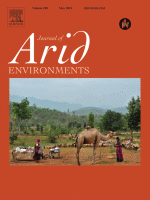How do agro-pastoralists cope with climate change? The case of the Nyangatom in the Lower Omo Valley of Ethiopia
 This study has examined traditional coping systems, emerging adaptation strategies and barriers to the adoption of these strategies. Structured questionnaires on coping and adaptation strategies were conducted among Nyangatom households, expounded by focus group discussions and key informant interviews. Correlations between times series (1987-2016) on rainfall, temperature and the local perceptions on climate change were examined. The time series analysis confirmed pastoralists' perception that the frequency of extreme drought has increased since 1987. The Nyangatom responded by temporal migration and herd diversification. Other responses include flood cultivation and enhancing alliance formation with other ethnic groups. Multi-nominal logistic regression analyses indicated that age of household head (−), livestock ownership (+), crop productivity (+), off-farm income (+) and access to climate information (+) proved to be key determinants with a statistically significant (negative or positive) effect on adoption. Other factors that hindered climate change adaption include intermittent conflicts with neighbouring ethnic groups and limited access to alternative livelihood options. Interventions to facilitate transition towards sustainable, adaptation-based communities need to incorporate deliberate, longer-term, risk-reducing strategies, including rangeland management, water harvesting and small scale-irrigation schemes. Improved education access, extension services, and a conducive pastoral policy environment will help to enhance the Nyangatom adaptive capacity.
This study has examined traditional coping systems, emerging adaptation strategies and barriers to the adoption of these strategies. Structured questionnaires on coping and adaptation strategies were conducted among Nyangatom households, expounded by focus group discussions and key informant interviews. Correlations between times series (1987-2016) on rainfall, temperature and the local perceptions on climate change were examined. The time series analysis confirmed pastoralists' perception that the frequency of extreme drought has increased since 1987. The Nyangatom responded by temporal migration and herd diversification. Other responses include flood cultivation and enhancing alliance formation with other ethnic groups. Multi-nominal logistic regression analyses indicated that age of household head (−), livestock ownership (+), crop productivity (+), off-farm income (+) and access to climate information (+) proved to be key determinants with a statistically significant (negative or positive) effect on adoption. Other factors that hindered climate change adaption include intermittent conflicts with neighbouring ethnic groups and limited access to alternative livelihood options. Interventions to facilitate transition towards sustainable, adaptation-based communities need to incorporate deliberate, longer-term, risk-reducing strategies, including rangeland management, water harvesting and small scale-irrigation schemes. Improved education access, extension services, and a conducive pastoral policy environment will help to enhance the Nyangatom adaptive capacity.
This article has appeared in Journal of Arid Environments, Volume 189, June 2021, https://doi.org/10.1016/j.jaridenv.2021.104485.
Read the full article (open access).

